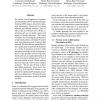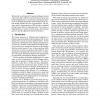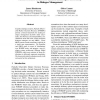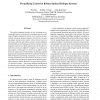ACL
2010
15 years 12 days ago
2010
We present a novel approach to Information Presentation (IP) in Spoken Dialogue Systems (SDS) using a data-driven statistical optimisation framework for content planning and attri...
118
click to vote
COLING
2002
15 years 2 months ago
2002
Language users have individual linguistic styles. A spoken dialogue system may benefit from adapting to the linguistic style of a user in input analysis and output generation. To ...
107
click to vote
COLING
2002
15 years 2 months ago
2002
We present an architecture for spoken dialogue systems where first-order inference (both theorem proving and model building) plays a crucial role in interpreting utterances of dia...
119
click to vote
CLIN
2001
15 years 3 months ago
2001
The present paper evaluates the role selected features and feature combinations play for error detection in spoken dialogue systems. We investigate the relevance of various, readi...
128
click to vote
ACL
2001
15 years 3 months ago
2001
We address the issue of on-line detection of communication problems in spoken dialogue systems. The usefulness is investigated of the sequence of system question types and the wor...
131
click to vote
LREC
2010
15 years 3 months ago
2010
We present Witchcraft, an open-source framework for the evaluation of prediction models for spoken dialogue systems based on interaction logs and audio recordings. The use of Witc...
121
click to vote
ACL
2008
15 years 3 months ago
2008
In spoken dialogue systems, Partially Observable Markov Decision Processes (POMDPs) provide a formal framework for making dialogue management decisions under uncertainty, but effi...
125
click to vote
IJCNLP
2005
Springer
15 years 7 months ago
2005
Springer
Abstract. One important component of interactive systems is the generation component. While template-based generation is appropriate in many cases (for example, task oriented spoke...
111
Voted
SEFM
2005
IEEE
15 years 8 months ago
2005
IEEE
The spoken language interface is now becoming an increasingly serious research topic with application to a wide range of highly engineered systems. Such systems not only include i...
128
click to vote
ICASSP
2008
IEEE
15 years 8 months ago
2008
IEEE
Robust Spoken Language Understanding (SLU) is a key component of spoken dialogue systems. Recent statistical approaches to this problem require additional resources (e.g. gazettee...




